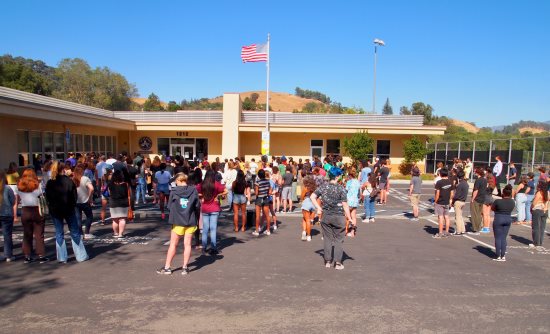| | Published August 19th, 2020
| AUHSD Board adopts new policy on racial equity, interdistrict transfers still contentious
| | | By Sophie Braccini |  | | A crowd gathers Aug. 4 in front of the AUHSD office in support of interdistrict transfers. Photo Pippa Fisher |
In the wake of the tragic death of George Floyd and the resulting conscious awakening of racial inequity and biases, parents and students demanded that the Acalanes Union High School District revise its equity policy. A group including students, parents and teachers, led by AUHSD Associate Superintendent Amy McNamara, worked over the summer to have a new policy in place for the start of the school year. Approved at the beginning of August, the policy's three main topics addressed are: a new code of conduct, a new bias incident reporting, and diversifying the curriculum.
 But a group of students, graduates, and other stakeholders in the AUHSD are asking for the board to restore the interdistrict transfer policy that was suspended in 2018. Their concern is that without it, the local high schools will remain segregated, and diversity and inclusion will suffer.
But a group of students, graduates, and other stakeholders in the AUHSD are asking for the board to restore the interdistrict transfer policy that was suspended in 2018. Their concern is that without it, the local high schools will remain segregated, and diversity and inclusion will suffer.
 The governing board believes that addressing the needs of all district students requires a commitment to racial equity and that race needs to cease to be a reliable predictor of student achievement. McNamara added that it is essential that the district interrupts institutional racism in its programs and activities. Ellide Smith, Campolindo Parents Club Diversity and Inclusion (DNI) committee chair, stated that the Campo group, along with the equivalent groups at the other AUHSD school sites were very influential in the formation of this new policy.
The governing board believes that addressing the needs of all district students requires a commitment to racial equity and that race needs to cease to be a reliable predictor of student achievement. McNamara added that it is essential that the district interrupts institutional racism in its programs and activities. Ellide Smith, Campolindo Parents Club Diversity and Inclusion (DNI) committee chair, stated that the Campo group, along with the equivalent groups at the other AUHSD school sites were very influential in the formation of this new policy.
 The new code of conduct prohibits racial slurs, epithets, symbols, and other forms of racist speech. To enact this policy the district is putting into place a bias or bullying reporting system that any student can activate, anonymously or not. If the offended party provides his or her name, there will be an immediate follow up and support system provided by staff. Clear and timely consequences are also defined for infringement of the new code. Consequences include no more participation in sports and clubs, and no more letters of recommendation for college.
The new code of conduct prohibits racial slurs, epithets, symbols, and other forms of racist speech. To enact this policy the district is putting into place a bias or bullying reporting system that any student can activate, anonymously or not. If the offended party provides his or her name, there will be an immediate follow up and support system provided by staff. Clear and timely consequences are also defined for infringement of the new code. Consequences include no more participation in sports and clubs, and no more letters of recommendation for college.
 Special attention will be paid to social media, on and off campus, and students will be informed about the consequences of inappropriate posts.
Special attention will be paid to social media, on and off campus, and students will be informed about the consequences of inappropriate posts.
 The other policy change adopted by the AUHSD involves revising curriculum and instructional materials to accurately reflect perspectives of the racial and ethnic diversity among students. The historical Eurocentric curricular and course offerings' institutional bias will be examined and addressed.
The other policy change adopted by the AUHSD involves revising curriculum and instructional materials to accurately reflect perspectives of the racial and ethnic diversity among students. The historical Eurocentric curricular and course offerings' institutional bias will be examined and addressed.
 Specific classes, training, and seminars are being offered to all students to examine racial identity, white privilege and institutional racism. Discussions started in the first week of school with teachers trained by Dr. Lori Watson, equity transformation specialist. McNamara hopes to also engage the parents through the wellness group and parents' groups so the conversations can continue at home.
Specific classes, training, and seminars are being offered to all students to examine racial identity, white privilege and institutional racism. Discussions started in the first week of school with teachers trained by Dr. Lori Watson, equity transformation specialist. McNamara hopes to also engage the parents through the wellness group and parents' groups so the conversations can continue at home.
 Smith noted that the new policy is a step in the right direction. She adds that the next step is properly informing and transparently taking action in the spirit of this new policy. This is an area that Smith says many feel has not always been the district's strongest suit. She is glad that what this policy does is allow parents and the community to hold the district and the high schools accountable.
Smith noted that the new policy is a step in the right direction. She adds that the next step is properly informing and transparently taking action in the spirit of this new policy. This is an area that Smith says many feel has not always been the district's strongest suit. She is glad that what this policy does is allow parents and the community to hold the district and the high schools accountable.
 The district also committed to hiring a diverse staff reflecting the student racial and ethnic demographics, however the Acalanes Union Coalition for Transfer Students (AUCTS) is saying that without reinstating the interdistrict transfer, this new equity policy is pointless.
The district also committed to hiring a diverse staff reflecting the student racial and ethnic demographics, however the Acalanes Union Coalition for Transfer Students (AUCTS) is saying that without reinstating the interdistrict transfer, this new equity policy is pointless.
 The group of AUCTS supporters gathered at the AUHSD office Aug. 4 to ask the board to reexamine the interdistrict transfer policy that was abolished in 2018. Superintendent John Nickerson explained that the policy that allowed for a number of students from other districts to ask to join the AUHSD had to be canceled for budgetary reasons. About 50 transfer students at the time were part of Miramonte and Campolindo high schools. The AUCTS argued that ending the policy did not create any savings and that asking for it to be reinstated to fill schools to capacity would not cost anything to the district, while it would enrich the high school experience, exposing students to a more realistic picture of the American culture, outside the Lamorinda bubble.
The group of AUCTS supporters gathered at the AUHSD office Aug. 4 to ask the board to reexamine the interdistrict transfer policy that was abolished in 2018. Superintendent John Nickerson explained that the policy that allowed for a number of students from other districts to ask to join the AUHSD had to be canceled for budgetary reasons. About 50 transfer students at the time were part of Miramonte and Campolindo high schools. The AUCTS argued that ending the policy did not create any savings and that asking for it to be reinstated to fill schools to capacity would not cost anything to the district, while it would enrich the high school experience, exposing students to a more realistic picture of the American culture, outside the Lamorinda bubble.
 The board members unanimously approved the new policy but rejected the idea of reinstating interdistrict transfers at this time, since the change would not be effective before the 2021-22 school year. They committed to reexamining the topic but would not decide when it would come back to the board.
The board members unanimously approved the new policy but rejected the idea of reinstating interdistrict transfers at this time, since the change would not be effective before the 2021-22 school year. They committed to reexamining the topic but would not decide when it would come back to the board.
 Smith explained that the DNI parents group does not have an official stance on interdistrict transfers and that it will be an agenda item on their next general group forum to discuss. Her personal opinion is that she is against any policy that perpetuates institutional or systemic racism and discrimination, but she adds that the data that she has received from the district has been murky and that it is a complex problem with no easy solution.
Smith explained that the DNI parents group does not have an official stance on interdistrict transfers and that it will be an agenda item on their next general group forum to discuss. Her personal opinion is that she is against any policy that perpetuates institutional or systemic racism and discrimination, but she adds that the data that she has received from the district has been murky and that it is a complex problem with no easy solution.
 The AUCTS has promised to stay on this topic and to work with the board to start the conversation again in the fall. In the meantime, the group is polling students and parents to gauge their support.
The AUCTS has promised to stay on this topic and to work with the board to start the conversation again in the fall. In the meantime, the group is polling students and parents to gauge their support.

|
| | | | | | | | | | | | |



